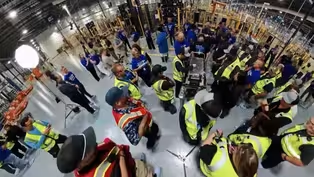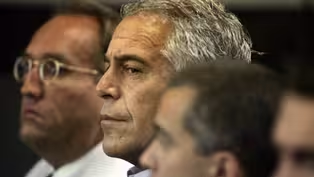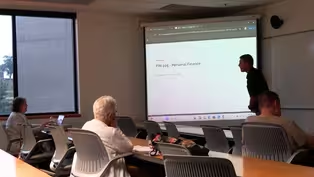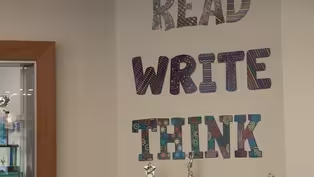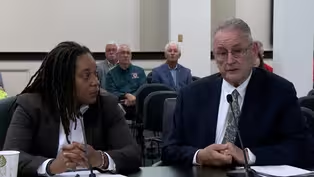
Auditor Ball Details KDE Report
Clip: Season 4 Episode 42 | 10m 30sVideo has Closed Captions
Auditor Allison Ball explains the findings and policy ideas that could come from it.
A more than 500-page report by the state auditor of the Kentucky Department of Education found no problems with the money handling, but a need for widespread improvements across the agency that oversees public schools in the state. Auditor Allison Ball discussed her findings with Renee Shaw.
Problems playing video? | Closed Captioning Feedback
Problems playing video? | Closed Captioning Feedback
Kentucky Edition is a local public television program presented by KET

Auditor Ball Details KDE Report
Clip: Season 4 Episode 42 | 10m 30sVideo has Closed Captions
A more than 500-page report by the state auditor of the Kentucky Department of Education found no problems with the money handling, but a need for widespread improvements across the agency that oversees public schools in the state. Auditor Allison Ball discussed her findings with Renee Shaw.
Problems playing video? | Closed Captioning Feedback
How to Watch Kentucky Edition
Kentucky Edition is available to stream on pbs.org and the free PBS App, available on iPhone, Apple TV, Android TV, Android smartphones, Amazon Fire TV, Amazon Fire Tablet, Roku, Samsung Smart TV, and Vizio.
Providing Support for PBS.org
Learn Moreabout PBS online sponsorshipA more than 500 page report by the state Auditor of the Kentucky Department of Education, found no problems with money handling, but the need for widespread improvements across the agency that oversees public schools and the state auditor, Allison Ball, says the examination provides a clear path forward for student success.
Teacher support and parent accessibility, and can help guide direction for the relatively new state.
Education chief Allison Ball came to our studios yesterday to explain the findings and the policy ideas that could come from it.
Honor to ball.
Thank you for being with us.
We appreciate it very much.
Glad to be here.
Let's talk about a report that is some has some age on it, but you just testified at the Interim Joint Committee on Education about this 500 page report, an audit of the Kentucky Department of Education that you said found widespread improvements that were needed across the agency.
Give the nut graph.
I know with 500 pages is hard to condense, but what are some main takeaways?
Yeah, it's a massive audit.
And so I'm always telling people it's worth reading the whole thing because it's got so much in it.
But there are a lot of big ticket items.
So one area in particular we spent a lot of time talking about is there needs to be a strategic plan that has goals that are actual metrics, like you can say this is measurable.
We have met this goal.
We can improve in this way.
So that is a big ticket item that has to and that hasn't been done or not.
So so really what we have at this point is we have, very aspirational, like we want to increase, we want to improve.
And so are that found.
Okay.
Those are great.
Like we want to begin that way.
Those are sort of vision statements.
But if you're going to make real improvement in your proficiency levels in other areas, you have to have measurables.
It's got to be, like we have to do this by this period of time.
So I know that sounds maybe overly simplistic, but that needs to happen in order for there to be improvement.
We looked at the proficiency levels and they're not great.
You're talking about in the elementary level, when it comes to reading 47%, you know, in the 40s for reading in mathematics.
And then in the 30s when it comes to science, then when you get to the high school level, then it's in the 30s for, reading, for math and then six percents for science.
So, the proficiency levels are nowhere near where they should be.
And the way you improve that is by having a very clear strategic plan that has mattresses that you can go through and measurables that you can improve.
Right.
So your goal was not to tell the KDE what they need to do, but here are the deficiencies to help you at least measure what is happening with students.
We definitely have a goal of doing that.
Like this is where you can improve.
These are plans.
And then we have some very specific things.
So for example, we spent a lot of time talking about preschools in Kentucky.
That's a a state statewide discussion right now.
What do we need to do about do we need to have mandatory preschool?
If we do, what does it look like?
And so we looked at, okay, well how are we doing with our preschools in Kentucky.
And right now the KDE works with an assessment call this the stars assessment when you're looking to see how you're doing to get how they're rating right and it's about a five point, assessment.
And then we found about the average was 2.7.
So that's considered to be not high quality.
That means most of the preschools in the couple of Kentucky that are receiving state dollars are not high quality.
And even the ones that were doing better.
So you had just a little under 50% that were, listed as a three, 4 or 5 star.
So those are the quality ones.
If you look at the top ten preschools in Kentucky, even they did not show a correlation with kindergarten readiness.
So, so that's a problem.
So we're not listing is we're not assessing them as a high level.
And then when you actually dig into it, they're actually not getting kids kindergarten ready.
So that's something I think is critically important right now as we're having this discussion about what do we do?
We have to make sure that we are getting quality education for these little ones.
And of course, sometimes parents don't even know the star system, right?
They don't understand what a two star versus a five star is.
So that's one area.
But then when you testified in the, in, Joint Committee on Education last week, it was mentioned by some Democrats that perhaps your findings substantiate the case that the governor has been making Andy Beshear and fellow Democrats for universal pre-K. Do you buy that?
Well, in my answer, the time was, well, first you got to fix the preschool issue.
Well, you got to have high quality preschools before making everybody go to them.
So that's what I said to him.
Our number one step has to be making sure they are getting kids kindergarten ready.
And that's been the big argument that I've heard most of the time.
And there's sometimes a, a daycare element too.
That's an argument.
But the big argument I usually hear is make sure you're getting kids kindergarten ready.
But if even our top ten, state funded preschools don't have a high correlation with kindergarten readiness, then that needs to be addressed before you do anything else.
I think it's, getting the horse before the cart.
If you do, if you move on too soon, that's got to be fixed.
First.
Do you anticipate that your report, more than 500 pages, will yield some type of legislation in the upcoming session?
I do, and like I said, it's over 500 pages.
We have some very clear legislative asks in that things that we think would be improved.
So I've already heard from many legislators that they are excited about this.
They want to take take on that.
Some of it is budgetary.
So I know that it's a budget year, but this is a budget year.
So I think that's even one of the reasons why it was important for me to do that testimony last week, because they're beginning to plan the budget and they need to hear, okay, what do we need to think about?
We did make recommendations when it comes to literacy coaches.
We talked about math education, numeracy.
So there's some areas where I think we could we could do more in those areas.
Something that I really care about right now is school counselors.
We, I know are in an epidemic of anxiety and depression and and even suicide for kids as young as elementary age.
So this is a serious, serious problem, not just in Kentucky.
It's true everywhere.
And, we're not really meeting the needs.
I think that we should be through school counselors.
So that was something that I talked about last week.
We have a goal right now of one counselor per every 250 students.
And right now we're like one every 300.
So that's pretty far off.
We need actually over 600 more counselors just to meet our goal.
And even the ones that are doing it, we have a goal of spend 60% of your time counseling, and that's probably not enough.
So that's your bare minimum.
That's our goal.
We're not even meeting our goal.
And I know it's hard to identify people to to go into this area, but I think we need to do whatever we can do to get high quality counselors in there for these kids.
It obviously impacts the mental health problems.
Like that's very serious, but it also impacts school violence and, you know, sexual abuse, any of these kinds of things that you're dealing with, you can do it if you have good counselors in place.
Some people, when they hear the word audit, they just things up.
Think of dollars and cents.
They don't think of these other kind of qualitative measurements that that you're mentioning.
But when it comes to the fiscal purse strings of the CD, did you find any deficiencies or misuse of funds in that regard?
Right.
That's a great question.
So we always do the financial work.
And and Katie actually does get a financial review every year from us as the auditors.
But we did dig into some certain specific things in this particular audit.
And one thing we did find had to do with seek funding.
We looked at about a four year period of time, and we found $250 million of Seac funding that have been allowed to lapse.
In our review of the budget bill, it said that you could use certain funding if you had other needs, you could use it for other seek, permissible funding, uses.
And so we looked at that, and I remember last session they came back, the Katy came back and said, well, we're about $40 million short in our rotation.
So this is a way that they could have remedied that situation.
Did they know that?
Did they understand that to be the case?
And that's a great question.
So they had a response back to us.
And I don't think that they understood that to be the case at all.
And so this has been this is one of those things where it's really good as we dig through and we look at the language of the budget bill, we look at the language of the statute, we look at what's permissible.
This will guide everybody moving forward.
So so a lot of times an audit is really future looking.
And I think this is one of those instances where, okay, this is a way to handle this in the future.
You can do that.
And this wasn't necessarily targeted at the current commissioner, Robbie Fletcher, to say you're not doing this right.
No.
And that's a great question.
I've been really careful to say he's new.
He has been there about a year.
And I actually think this is a wonderful time for this audit to come out, because it gives him a blueprint to work on.
You know, it takes a little while to get your, your footing and start to make changes and plans.
And I think he's at that point right now where he can address things that need to be addressed.
Some people would question whether or not this is any of this is politically motivated or politically politically advantageous to a particular party of which you are a member.
Sure.
I mean, I have learned that any time you come in an audit, people get nervous and they don't really like having somebody come in and overlook their documents in their books.
And, it's very common.
People say, oh, this is political.
But I keep going back to I want good, solid education in the Commonwealth of Kentucky.
We've been really careful to do this the right way.
I have a staff of auditors that have been working in my office for for decades.
We have excellent people working on it, and we contracted out to we contracted education experts to come in, and look at what we're doing and advise us and help us.
So we've been really careful.
This is an Alice in Balls opinion.
This has been a team effort.
We've hired consultants, we have interviewed, we've gone onsite to schools, we review documents.
We have done all the work for probably about nine months, making sure we are thorough.
And it's not just me.
That we're we're very data driven and guided by expertise on this last question, as you very well know, Commissioner Fletcher did kind of take some issues and point out a potential conflict of interest with the firm that was hired, that they already had contracts with the KDE, and they were up for a couple of more, that they did not get to respond to that.
Sure.
So actually, if there was a conflict of interest, that would be really on their side because, they've been retained by the cadets.
And before we didn't have a problem, we didn't have any concerns because it would go that way if they were going to give anybody the benefit of the doubt or favor, it would be the ones who were paying them previously.
And so we actually did think about that.
Like, is it okay for us to use them if they're being if they've been retained by CDD before or are they, conflicted out?
But they are national experts.
They've done a really good work.
And they had a different team of people working for us on, on what we worked on.
So actually the conflict would be the other way around.
And we check that out.
We we verified it that we had a different team of people, and we felt good about it.
Yeah.
Well, auditor Allison Ball, it's good to see you.
Thank you so much for stopping by.
Thank you very much.
Arthur Ball says other recommendations for state lawmakers to consider during next year's lawmaking session concerning the state Department of Ed are a tracking system for title nine violations and student athletics specifically addressing boys playing in girls sports.
And a database for middle and high school coaches charged with are being investigated for sexual abuse or inappropriate behavior involving a minor.
BlueOval SK Workers Voting to Decide Whether to Unionize
Video has Closed Captions
Clip: S4 Ep42 | 1m 3s | The United Auto Workers started its push to unionize the Hardin County plant last year. (1m 3s)
Comer's Committee Subpoenas Epstein Estate
Video has Closed Captions
Clip: S4 Ep42 | 43s | The subpoena demands documents, his contact books and more. (43s)
Kentucky Group Working to Help Seniors Get Back to Work
Video has Closed Captions
Clip: S4 Ep42 | 4m 29s | The 75-and-up age group is the fastest-growing workforce population. (4m 29s)
Kentucky Supreme Court to Take Up Charter School Case
Video has Closed Captions
Clip: S4 Ep42 | 45s | The court will consider whether a funding mechanism for charter schools is constitutional. (45s)
Lawmakers Introduce Bipartisan Plan to Expand Voting Rights
Video has Closed Captions
Clip: S4 Ep42 | 3m 22s | A bipartisan pair of lawmakers wants to turn an executive order on the matter into law. (3m 22s)
Providing Support for PBS.org
Learn Moreabout PBS online sponsorship
- News and Public Affairs

Top journalists deliver compelling original analysis of the hour's headlines.

- News and Public Affairs

FRONTLINE is investigative journalism that questions, explains and changes our world.












Support for PBS provided by:
Kentucky Edition is a local public television program presented by KET
